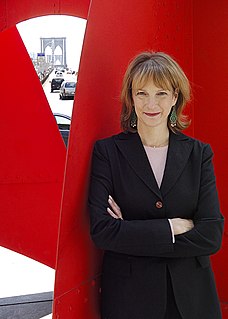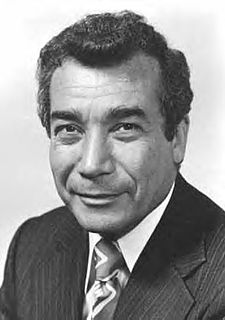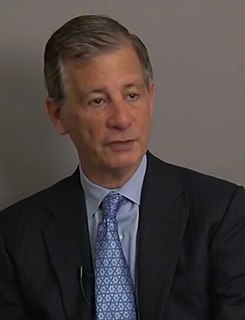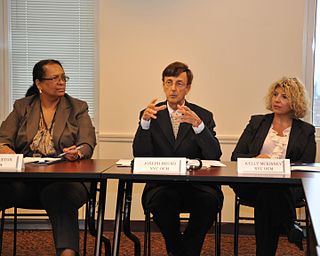Related Research Articles

The Mayor of New York City, officially Mayor of the City of New York, is head of the executive branch of the Government of New York City and the Chief Excutive of New York City. The mayor's office administers all city services, public property, police and fire protection, most public agencies, and enforces all city and state laws within New York City.

Lincoln Center for the Performing Arts is a 16.3-acre (6.6-hectare) complex of buildings in the Lincoln Square neighborhood of Manhattan in New York City. It has thirty indoor and outdoor facilities and is host to 5 million visitors annually. It houses nationally and internationally renowned performing arts organizations including the New York Philharmonic, the Metropolitan Opera, and the New York City Ballet. Juilliard School of Music also became part of the Lincoln Center complex.

Mark Joseph Green is an American author, former public official, public interest lawyer and Democratic politician from New York City. He worked with Ralph Nader from 1970 to 1980, eventually as director of Public Citizen's Congress Watch, and was president of Air America Radio from 2007 to 2009. His 2001 campaign for mayor of New York is chronicled in the 2002 Sundance film Off the Record: The 9/11 Election.

The New York City Opera (NYCO) is an American opera company located in Manhattan in New York City. The company has been active from 1943 through 2013, and again since 2016 when it was revived.

Patricia Harris is the chief executive officer of Michael Bloomberg's philanthropic foundation, Bloomberg Philanthropies. She was first deputy mayor for the City of New York from 2002 to December 31, 2013. She advised the Mayor of New York City, then Bloomberg, on administrative, operational, and policy matters. As of 2016, she was listed as the 87th most powerful woman in the world by Forbes.

Herman Badillo was a trailblazing Puerto Rican politician who served as borough president of The Bronx and United States Representative, and ran for Mayor of New York City. He was the first Puerto Rican elected to these posts, and the first Puerto Rican mayoral candidate in a major city in the continental United States.

Raymond Walter Kelly is the longest serving Commissioner in the history of the New York City Police Department (NYPD) and the first man to hold the post for two non-consecutive tenures. According to its website, Kelly — a lifelong New Yorker—had spent 45 years in the NYPD, serving in 25 different commands and as Police Commissioner from 1992 to 1994 and again from 2002 until 2013. Kelly was the first man to rise from Police Cadet to Police Commissioner, holding all of the department's ranks, except for Three-Star Bureau Chief, Chief of Department and Deputy Commissioner, having been promoted directly from Two-Star Chief to First Deputy Commissioner in 1990. After his handling of the World Trade Center bombing in 1993, he was mentioned for the first time as a possible candidate for FBI Director. After Kelly turned down the position, Louis Freeh was appointed.

The New York City Schools Chancellor is the head of the New York City Department of Education. The Chancellor is appointed by the Mayor, and serves at the Mayor's pleasure. The Chancellor is responsible for the day-to-day operation of the department as well as responsible of all New York City Public Schools. The Chancellor is also a member of the New York City Panel for Educational Policy. The current Chancellor is David C. Banks.

Stephen "Steve" Goldsmith is an American politician and writer who was the 46th mayor of Indianapolis. He also served as the deputy mayor of New York City for operations from 2010 to 2011. A member of the Republican Party, he ran unsuccessfully for lieutenant governor of Indiana in 1988 and governor of Indiana in 1996. He is currently the Daniel Paul Professor of Government, Director of Innovations in Government Program, and Director of Data-Smart City Solutions at the John F. Kennedy School of Government at Harvard University.
Nicholas Scoppetta was the 31st New York City Fire Commissioner. He was appointed to that position by Mayor Michael Bloomberg on January 1, 2002 and was succeeded by Salvatore Cassano on January 1, 2010. He had previously served as the Commissioner of the city's Administration for Children's Services.

Joseph F. Bruno is a public official in New York City who has served as a lawyer, FDNY Fire Commissioner, New York City Civil Court Judge and New York State Supreme Court Judge. He most recently served as Commissioner of the New York City Office of Emergency Management.
Verna Eggleston served as the Commissioner for New York City's Human Resources Administration (HRA) for the Bloomberg Administration, appointed by former New York Mayor Michael R. Bloomberg. She was the longest serving Commissioner of the agency, serving in this role from 2002 to 2007, and was the first Commissioner appointed to the position twice by the same sitting Mayor. Under her leadership, HRA developed "We Care", a Mayoral initiative which received the 2008 Innovation Award from the United States Department of Labor. in 2016, Eggleston received the Civic Leadership Award from the Citizens Committee in New York, where she serves as a permanent member, representing Bloomberg Philanthropies in "consultative status with the United Nations Economic and Social Development Council."

The New York City Department of Sanitation (DSNY) is the department of the government of New York City responsible for garbage collection, recycling collection, street cleaning, and snow removal.

Henry Jordan Stern was a member of the New York City Council from 1974 to 1983 and appointed as the Commissioner of the New York City Department of Parks and Recreation from 1983 to 1990 and again from 1994 to 2000.

Robert Larkin Doar is an American academic, businessman, and former public administrator serving as the president of the American Enterprise Institute. His research focuses on federal and state antipoverty policies and safety net programs.

Dennis M. Walcott is the former Chancellor of the New York City Department of Education. He succeeded Cathie Black, who resigned in April 2011 after only three months on the job. He was succeeded as chancellor by Carmen Fariña. He is the president and chief executive officer of Queens Public Library.
Jacques Jiha is the Director of the New York City Mayor's Office of Management and Budget. In this role, he oversees New York City’s fiscal policy, including the development of the Expense and Capital Budgets, the City’s bond and borrowing program, and the budgets of more than 90 City agencies and related entities. As Budget Director, he will continue to help lead New York City out of the financial crisis brought on by the COVID-19 pandemic through strong fiscal management. Previously, he served as Commissioner of the New York City Department of Finance, a position he has held in the administration of Mayor Bill de Blasio.

Gordon Jamison Davis is an American lawyer and civic leader. He was born in Chicago in 1941 and has been a resident of New York City since his graduation from Harvard Law School in 1967, and has been a prominent leader in New York City's public, civic, and legal affairs for four decades. He was Mayor Ed Koch's first New York City Parks Commissioner and is considered one of New York's most successful parks commissioners. Since 2012, Davis has been a partner in the New York office of the law firm Venable LLP.
The Commissioner of Health of the City of New York is the head of the city's Department of Health and Mental Hygiene. The commissioner is appointed by the Mayor of New York City, and also serves on the city's Board of Health with the chairperson of the Department's Mental Hygiene Advisory Board and nine other members appointed by the mayor.
The New York City Mayor's Office of Management and Budget (OMB), formerly New York City Office of Management and Budget, is the New York City government's chief financial agency, organized as part of the New York City Mayor's office. OMB staff, under the direction of the Mayor and the Budget Director, assemble and oversee the expense, revenue, and capital budgets for the city. The City of New York funds the activities of approximately 70 agencies with more than 300,000 full-time and full-time equivalent employees.
References
- ↑ "Lincoln Center Prez Ends His Long Run". New York Post. March 28, 2000.
- 1 2 3 Exiting Lincoln Center, as Meticulous as Ever. New York Times . March 29, 2000.
- ↑ "Nat Leventhal, The Man Who Really Runs New York". NY Daily News. February 12, 1981.
- ↑ "Leventhal, new deputy, functions by the numbers". NY Daily News. August 3, 1979.
- ↑ "New Commissioner Appointed". New York Times . May 3, 1972.
- ↑ "NY Chief-Leader". New York Times . February 7, 1984.
- ↑ "Nathan Leventhal is appointed Housing Commissioner by Mayor". New York Times . January 14, 1978. p. 25.
- ↑ "Koch Shuffles Highest Aides... Leventhal Elevated". New York Times . August 3, 1979.
- ↑ "Koch Losing His Right Hand Man". NY Post. February 8, 1984. p. 14.
- ↑ Michael, Goodwin (2005). New York Comes Back: The Mayoralty of Edward I. Koch. pp. 30–31.
- ↑ "Deputy Mayor Named to Lincoln Center Post". NY Post. February 8, 1984. p. 14.
- ↑ "The Artful Manager". NY Times. February 10, 1984. p. 26.
- ↑ "Leventhal's Skill Will be Missed". NY Post. February 8, 1984. p. 30.
- ↑ "Leventhal, A Hands-On Administrator". NY Times. February 8, 1984.
- ↑ Rockwell, John (November 16, 1988). "If Mostly Mozart Is So Good, Why Not Perform All of Him?". NY Times.
- ↑ Teltsch, Kathleen (June 11, 1990). "A Building By Any Other Name". NY Times.
- ↑ "Recasting Lincoln Center's Role, then bowing out". NY Times. March 29, 2000.
- ↑ "Lincoln Center President to Leave After 17 Years". NY Times. March 28, 2000.
- ↑ "One Who Has Been Everywhere Leads". NY Times. November 19, 1989.
- ↑ "Bellone selects Taskforce to review Suffolk County budget". Riverhead News. January 6, 2012.
- ↑ "Budget & Finance Advisory Committee". Southampton, NY.
- ↑ "Palm Beach Opera". Official website.
- ↑ "Nominating/Corporate Governance Committee". Movado.
- ↑ "105th Congress PN 138". Congress.
- ↑ "Mayor Bloomberg Announces Four Appointees To City Planning Commission". NYC.gov. February 1, 2007.